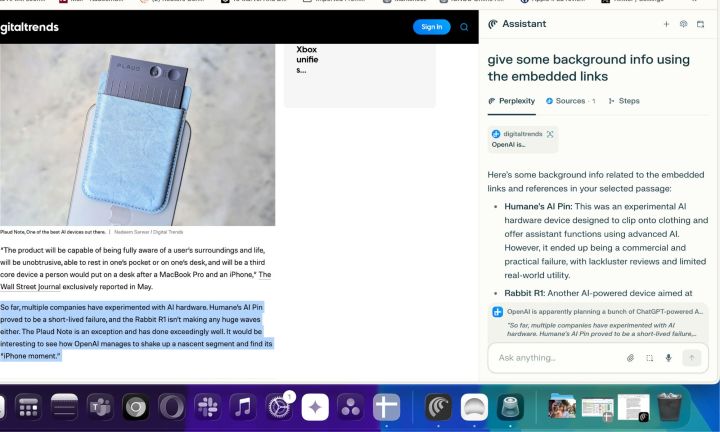Select Language:
The internet is evolving at a breakneck pace. The traditional list of blue search links is fading, replaced by AI chatbots that provide detailed, textbook-style answers. Because of this shift, AI-powered agents are becoming a fundamental part of web browsers. Whether you’re a fan or not, this trend is only expected to grow stronger.
We’ve entered a new chapter in browser competition, with newer players taking the lead. One such browser, Dia, is built with an emphasis on AI, and I’ve become quite fond of it. About a month ago, I finally gained access to Perplexity’s exclusive Comet browser, and ever since, I haven’t felt the urge to look elsewhere. If you happen to get an invite, you’re likely to have a similar experience. Let’s explore what makes it stand out.
### What is Comet?
Comet puts the Perplexity knowledge engine directly at the forefront of your browsing experience, but it’s much more than just that. The big plus is that it’s based on Chromium, the same foundation as Google Chrome, which means importing your bookmarks, data, and extensions is a breeze. While familiar in its core structure, it offers a fresh take with a different user interface, especially in dark mode, and a sleek widget system on the home page.
Despite sharing a base with Chrome, Comet is a radically different kind of browser. Instead of directing you to Google Search, it answers your questions directly using the Perplexity engine. Its interface feels elegant and modern, with widgets on the home screen that provide quick access to essential features.
It also includes a personalized discover feed on the left sidebar, populated with content tailored to your interests. Beneath that, you’ll find Spaces—think of these as dedicated work environments or profiles. Here, you can organize your searches and conversations, save files and links, choose specific AI models, connect with third-party apps, and set custom browsing instructions.
Each Space can be dedicated to specific sources like websites, research articles, social media, cloud storage, or local files. You can choose from preset templates for common tasks, and these Spaces are shareable and collaborative, effectively creating a browser-within-a-browser environment tailored to particular tasks or projects.
Another standout feature is how Comet allows you to create custom shortcuts—simple commands in plain language that automate routine tasks. For example, I set up a shortcut to go through pitches I receive for testing new products; just type the command, and it handles everything behind the scenes. It’s a convenient way to streamline workflows without complex scripting.
### The AI Intelligence
The core attraction is the integrated AI assistant, which resides in a collapsible sidebar. Think of it as an intelligent co-pilot that helps you handle supplementary searches or clarifications without disrupting your workflow. While browsing an article, if a term pops up you’re unfamiliar with, you can ask the assistant to explain — all within the same window. It’s a significant time-saver and keeps the flow uninterrupted.
The assistant can also monitor your open tabs, providing summaries or key points from videos, articles, or comparisons across multiple sites. For instance, if you have several shopping tabs open, the AI can generate a comparison table of items, making shopping and research much more efficient.
### Automation Capabilities
One of the most exciting aspects of Comet is its ability to automate complex, multi-step tasks. Simply describe what you want it to do—whether it’s booking tickets, researching a topic, or scraping data—and the AI takes care of the entire process. It’s a powerful tool for users looking to save time on repetitive online activities.
You can also connect Comet with third-party services like Notion, Gmail, Dropbox, and others through its bridges. These integrations enable it to perform cross-platform automation, such as checking your calendar, retrieving emails, or managing files seamlessly. For example, I asked the AI to review my upcoming engagements and draft responses based on my emails and calendar—tasks it completed automatically, running quietly in the background.
This smart automation sometimes oversteps, like placing orders without explicit instructions on quantities or payment methods. While it can handle end-to-end processes, it’s essential to maintain clarity when giving commands. Still, witnessing an AI agent manage even complex tasks independently is quite impressive.
### In Summary
Comet reimagines how we interact with a web browser. Moving away from the traditional keyword-based navigation, it offers a conversational experience that feels more natural and efficient. For anyone seeking a more private, AI-driven browsing alternative, Comet presents a compelling option worth exploring.
Although it’s resource-intensive—a bit on par with Chrome—it works smoothly on mid-tier systems with 16GB of RAM or more. For my part, it has already replaced Chrome as my go-to browser, and I don’t see myself switching back anytime soon.
If you’re interested in a smarter, more productive browsing experience that leverages AI and personal workflows, Comet could be the browser to transform your online habits.







